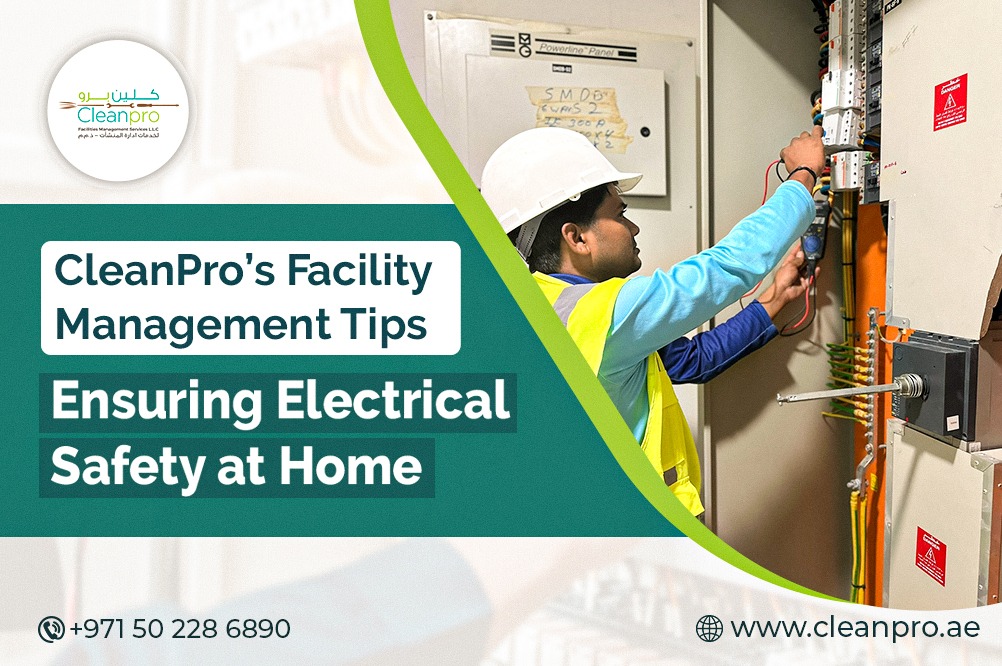Understanding the Dangers: Why Electrical Safety is Important
Before getting to the tips, it is essential to understand the risks associated with electricity. Faulty wiring, overburdened circuits, damaged appliances, and simple negligence could lead to severe and catastrophic consequences, including but not limited to:
- Electric Shock: Contact with live wires can result in electric shock; the shock can range from a mild tingle to electrocution.
- Burns: Electrical currents can generate heat, potentially causing severe burns.
- Fires: Faulty wiring and overloaded circuits are common causes of house fires.
- Damage to Appliances: Power surges and other electrical issues can damage expensive appliances.
CleanPro’s Essential Electrical Safety Tips for Your Home:
Now, let's explore some practical tips to keep your home electrically safe:
1. Regular Inspections are Key:
Professional Check-ups: Schedule regular inspections by a qualified electrician to identify potential hazards like faulty wiring, outdated electrical panels, or other issues. This is a proactive approach that can prevent problems before they occur.
DIY Visual Checks: In between professional inspections, make it a habit to visually inspect your electrical cords, outlets, and switches. Look for any signs of damage, such as frayed cords, cracked outlets, or loose switches.
2. Handle Cords with Care:
- Avoid Overloading: Don't overload extension cords or power strips. Overloading can cause overheating and increase the risk of fire. Use surge protectors with built-in overload protection.
- Check for Damage: Regularly inspect cords for cuts, fraying, or exposed wires. Damaged cords should be replaced immediately.
- Proper Plugging and Unplugging: Always grasp the plug, not the cord, when plugging in or unplugging appliances. Pulling on the cord can damage the wires.
- Keep Cords Organized: Avoid running cords under carpets or rugs, where they can be damaged or create a tripping hazard. Use cord organizers to keep them neat and tidy.
3. Outlet and Switch Safety:
- Replace Damaged Outlets and Switches: Cracked or loose outlets and switches should be replaced immediately by a qualified electrician.
- Use Childproof Outlets: If you have young children, install childproof outlets to prevent them from inserting objects into the slots.
- Avoid Overcrowding Outlets: Don't plug too many devices into a single outlet. Consider using power strips with surge protection to increase the number of outlets safely.
4. Appliance Safety:
- Unplug Appliances When Not in Use: Unplug appliances when you're not using them, especially those that generate heat, like toasters, hair dryers, and irons. This not only saves energy but also reduces the risk of electrical hazards.
- Check for Appliance Damage: Regularly inspect your appliances for any signs of damage, such as frayed cords, loose connections, or unusual smells. If you notice any problems, have the appliance repaired or replaced.
- Keep Appliances Away from Water: Never use electrical appliances near water. Keep hair dryers, curling irons, and other electrical devices away from sinks, bathtubs, and showers.
5. Circuit Breaker and Fuse Box Safety:
- Know Your Circuit Breaker Box: Familiarize yourself with the location of your circuit breaker box and how to reset a tripped breaker.
- Avoid Overloading Circuits: If a circuit breaker trips frequently, it's a sign that the circuit is overloaded. Unplug some devices or consult an electrician to address the issue.
- Replace Fuses Properly: If you have a fuse box, make sure you know how to replace fuses correctly. Use the correct type and amperage of fuse.
6. Outdoor Electrical Safety:
- Be Careful with Outdoor Equipment: When using outdoor electrical equipment, such as lawnmowers or trimmers, make sure the cords are in good condition and avoid using them in wet conditions.
- Keep Trees Trimmed: Keep trees and shrubs trimmed away from power lines.
- Call Before You Dig: Before digging in your yard, call your local utility company to locate underground power lines.
7. General Electrical Safety Tips:
- Don't Do DIY Electrical Work Unless Qualified: Unless you're a qualified electrician, avoid attempting any electrical repairs yourself. It's best to leave electrical work to the professionals.
- Use Proper Lighting: Ensure that all areas of your home are adequately lit to prevent accidents.
- Have a Fire Extinguisher Handy: Keep a fire extinguisher readily available in case of an electrical fire.
At CleanPro Cares, we understand that maintaining a safe and functional home is a top priority. While we specialize in facility management and cleaning services, we also believe in empowering homeowners with valuable information to keep their homes safe. By following these electrical safety tips, you can significantly reduce the risk of electrical hazards in your home.
Our team of experienced professionals can handle everything from electrical repairs and plumbing issues to AC maintenance and pest control. We are your one-stop shop for all your home maintenance needs.
Contact us today to learn more about our facility management services and how we can help you create a safer and more enjoyable living environment.
Don't wait until a problem arises – be proactive and let CleanPro Cares help you maintain a safe and worry-free home.




